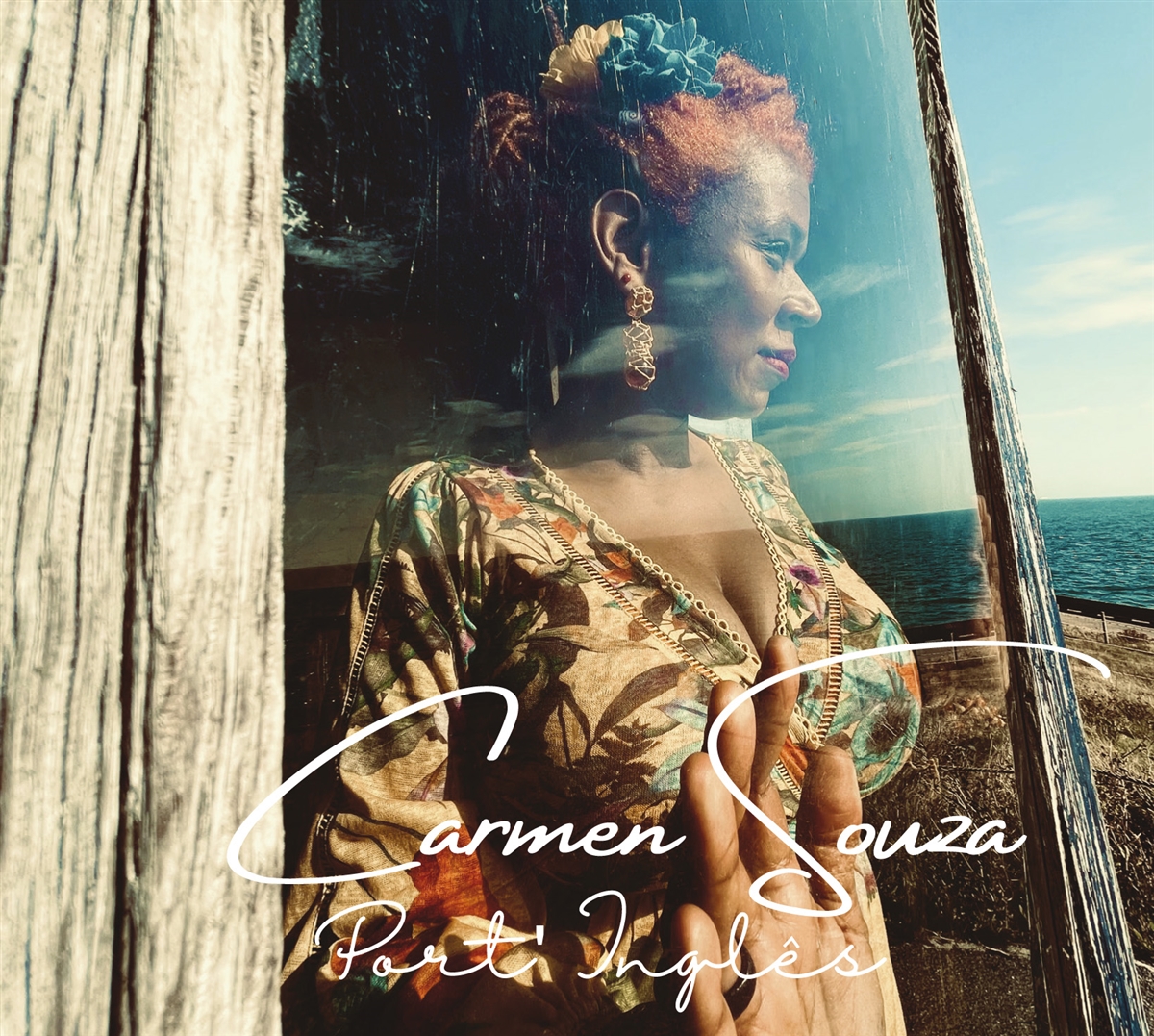Carmen Souza: Port’Inglês
27th September 2024

The seamstress of worlds and words, Carmen Souza, returns with her eleventh album Port’Inglês (English Port). This Arts Council England supported album releases through Galileo Music Communication on 27th September 2024, with the launch concert taking place on 30th November at London’s Crazy Coqs. Port’Inglês reveals untold stories from years of British presence in Cape Verde and the decolonisation struggle under Portugal. “Port’Inglês” is Carmen Souza’s deeply personal journey exploring her roots and, in the process, exploring what alchemy arises from the dust of pain, loss and chaos of this colonised period.
“Port’Inglês” is a celebration of Cape Verdean identity. It is fascinating to accompany Carmen through this musical suite as she explores the origins of her diasporic identity through language and different voices from colonised Cape Verde. She links the UK and Cape Verdean worlds, both connections close to her heart.Jazz waltzes freedom with traditional Cape Verdean rhythms such as funaná, contradança, morna and mazurka; as well as with English folk inspired sea shanty “Francis Drum” which portrays contradictory sides of English explorer, Francis Drake. Was he a British hero sailor or a terror and pillager?
Carmen Souza and long-time collaborator Theo Pascal’s two decade, matured original Lusophone/Cape Verdean sounds, add another dimension to the music and symbolise the significant cultural exchange embodied within the album. The collaboration of prominent jazz musicians from across the globe reinforces and celebrates this interconnectedness. Musicians include Elias Kacomanolis (Mozambique), Diogo Santos (Portugal), João Oliveira (Angola), Deschanel Gordon (UK), Zoe Pascal (UK/Portugal), Mark Kavuma (UK) and Gareth Lockrane (UK). “Port’Inglês” breaks chains, journeying beyond linguistic and cultural confines. Whilst proclaiming the saga of the Islands, the music echoes a call for freedom traversing geography.
Significantly, “Port’Inglês” releases the same year Portugal celebrates 50 years of the Carnation Revolution, the military coup that overthrew the authoritarian Estado Novo government in 1974. This movement paved the way for the end of Wars in colonial Africa and opened the door to Independence from Portugal. “Port’Inglês” celebrates and reclaims unheard Cape Verdean voices that shape identity today. Carmen Souza’s Master’s thesis on the British presence in Cape Verde inspired the album:
“I drew inspiration from the tales told in Cape Verde to create this musical suite. Through my research for my Master’s thesis, I sought to embody this historical period through music. The album explores themes of cultural identity, resistance, colonialism and the ongoing struggle for decolonisation, highlighting the connection between Cape Verde and the UK. Inspiration came from popular tales, tales of the sea, and even sea shanties from British folk music.”
Carmen resided in the UK for 16 years, a country that nurtured her creativity. Her research reveals a bond she hadn’t yet realised between the UK and Cape Verde. The synchronicity of Charles Darwin sailing to Cape Verde from Woolwich Arsenal, the very London town she made home for four years, all the more symbolises this shared connection. The morna “Cais D' Port’Inglês” portrays cultural assimilation through the sea waves during the British presence: “In the piers of these English ports/ There is richness/That the sea waves bring and take away…”
Whilst unravelling untold stories, Carmen unravels her identity. She explores how the British presence shaped her motherland’s culture; a culture she inherited. This new music demonstrates how intimately linked culture and language are. The track “Moringue” reflects how different languages on the same land can create misinterpretation and missed connection between individuals. Whereas, “Ariope” describes connection through the incorporation of English language into native Cape Verdean Creole and shaping a new identity. For example, “hurry up” becomes “ariope” – terms Carmen Souza heard from her parents and as part of her culture. The backdrop in “Ariope” of port workers addressed derogatorily gives insight into the abuse of power in Cape Verde.
Yes, this is personal. Yet, “Port’Inglês” reflects that things are not clear-cut. The album portrays different realities of this colonised period and suggests imprints left on future generations. Like an ink-stained fingerprint, identity does not remain the same.
The album carries angry jazz and probes: “If colonization/was such a benefit/why did you need chains and whips to make it convincing/what worth is there/in a prosperity stained with blood and pain? ...” (Track 2, “Pamodi”). However, the song “Amizadi” tells a story of friendship between two cultures based on prolific Cape Verdean writer, composer and singer B. Leza’s support and admiration for the British: “Let me tell you the Friendship story between two cultures/ This story is not in the books/ It is not taught at schools/ The British and their boats came to sail in our waters/ To make business, buying Donkeys, Salt and Anchil/… Pirates came and destroyed cities and churches… The British came defend our ports…”
Carmen Souza opens a porthole into histories. Perhaps traditional history prefers linear structure. “Port’Inglês” defies tradition by presenting authentic experiences. The album sound creation process also reflects this integrity. Composer Theo Pascal reflects: “Our priority was to allow each instrument’s acoustic ‘colours’ to shine through organically, without requiring extensive digital processing or effects. The use of analogue and other digital recording techniques is a nod to the historical nature of the stories we tell here, adding a layer of authenticity to the album.”
Carmen Souza’s music is celebrated for not fitting into a box. Now, Carmen Souza’s untold stories rise from the ashes of the past to rock the boat.
“Port’Inglês” releases internationally through Galileo MC on
September 27th 2024.
Tickets for launch November 30th at Crazy Coqs London, click here